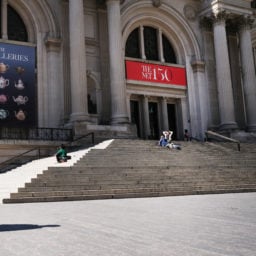Twitter has unleashed a tirade of criticism of the British Museum in London after its director Hartwig Fischer published a statement in solidarity with the Black Lives Matter movement. The institution is the latest to be called out by members of the public for making a response to the murder of George Floyd and the subsequent worldwide demonstrations that, they say, does not align with its actions.
“The British Museum stands in solidarity with the British Black community, with the African American community, with the Black community throughout the world. We are aligned with the spirit and soul of Black Lives Matter everywhere,” the museum’s director wrote in the statement, published on the British Museum’s blog on Friday, June 5.
Observers were quick to point out that this same institution is known for closely guarding its collection of colonial-era objects from Africa, including the Benin Bronzes, as well as other contested items such as the Parthenon Marbles. And they noted that Fischer had left out key actionable words like “repatriation” and “restitution.”
The more than 1,000 responses on Twitter range from the concise (“the irony”; “Awkwardly delivered in front of piles of stolen art and relics…”; “Um who’s going to tell them?”) to the incisive (“The British Museum has stolen goods from Africa for centuries. We will hear you when you return our ancestral treasures and put funding into preserving a museum in our homeland. All the money you have acquired from us for decades. Until then, this is performative.”).
“The audacity to even write [B]lack [L]ives [M]atter when the British Museum is built on the exploitation of [B]lack lives, [B]lack bodies and [B]lack labor,” another user wrote.
In response, the British Museum said (with quite British reserve) that it “will take all feedback into consideration.” “A spokesperson said: “We value all audience feedback and recognize that restitution is an issue many people feel very strongly about.” The museum also noted that such issues will be engaged with more directly in its new master plan—although the spokesperson made no mention of restitution itself.
“Though it will take time to realize, the museum’s developing masterplan project provides a unique generational opportunity to reconsider, rethink and rebalance the display of the collection, introducing greater diversity of collections on display, expanding museum narratives,” the spokesperson said. “And above all, involving multiple voices.”
While the museum might be eager to move on, curator Dan Hicks of the Pitt Rivers Museum and Professor of Contemporary Archeology at Oxford University is preserving all of the tweets for prosperity. He has collected the 1,000-plus responses via his handle @BrutishMuseum.
“These are hollow claims while the British Museum continues to deny requests for the permanent restitution of the Benin Bronzes,” Hicks said on Twitter, in reference to the sculptures taken in 1897 in a military attack on what is now Nigeria. “And hollow claims,” he added, “while the British Museum continues to allow BP sponsorship to art-wash the neo-colonial extractivist projects of oil companies, at a time in which the effects of climate climate change continue the violence and dispossession suffered across the Global South.”
Ciraj Rassool, a professor of history at the University of the Western Cape, also found the letter disconcerting. He tweeted: “Very odd to talk of solidarity, the politics of diversity, inclusion and colonial legacies without acknowledging colonial violence and its implications for collections.”









